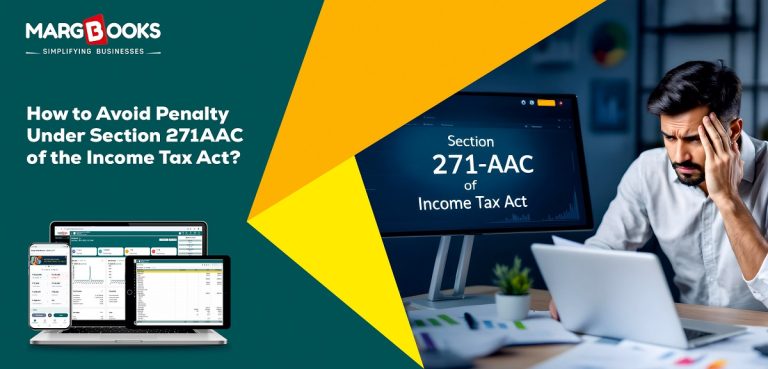The Income Tax Act of India is comprehensive, with various provisions aimed at maintaining fairness and transparency in the taxation system. One such provision is Section 271AAC, which deals with penalties for underreporting or misreporting income. This section aims to curb tax evasion and ensure that taxpayers are honest in their reporting. However, it can result in significant penalties for those who inadvertently or intentionally fail to comply with the rules.
In this blog post, we will explore how to avoid penalties under Section 271AAC of the Income Tax Act and how tools like Online GST Billing Software and inventory management software can help ensure proper tax compliance.
What is Section 271AAC of the Income Tax Act?
Section 271AAC of the Income Tax Act was introduced to tackle instances of tax evasion and underreporting of income. The section specifically imposes penalties on individuals or entities that underreport their income, either deliberately or due to negligence.
Key Points Under Section 271AAC
- Penalty for Underreporting: If a taxpayer is found to have underreported their income, they may be liable for a penalty of 50% of the underreported income.
- Applicability: The provision applies to cases where the Income Tax Department believes that there has been a deliberate attempt to underreport or misstate income.
- Legal Framework: The penalty under Section 271AAC is levied after detailed scrutiny by the tax authorities. If they detect underreporting, the taxpayer will be allowed to present their case before a penalty is imposed.
Understanding the gravity of these provisions can help taxpayers avoid costly mistakes and penalties.
Steps to Avoid Penalty Under Section 271AAC of the Income Tax Act
Avoiding penalties under Section 271AAC requires careful tax planning and a strong system of checks and balances. Below are some practical steps you can take to ensure compliance with the Income Tax Act and avoid unnecessary penalties.
1. Maintain Accurate Financial Records
One of the most important steps to avoid underreporting is to maintain accurate and up-to-date financial records. Misreporting or underreporting income often stems from poor documentation or sloppy accounting practices.
- Record All Income: Ensure that every source of income is accurately documented. This includes both business and personal income.
- Track Expenses Carefully: Ensure all expenses are correctly recorded and justified with proper receipts and bills.
Using Online GST Billing Software can help automate the process of recording GST payments and filing returns, thereby reducing the chances of errors. Software solutions like MargBooks can also help you keep track of all transactions and expenses in real time, making it easier to comply with tax regulations.
2. File Your Returns on Time
Filing income tax returns (ITR) on time is crucial to avoid penalties under various sections of the Income Tax Act, including Section 271AAC. Filing late returns may give the impression of evasion or negligence.
- Timely Filing: Always file your returns before the due date to avoid late fees and interest charges.
- Correctly Report All Income: Ensure that all income is disclosed in your ITR, including any additional or supplementary income sources. Failure to do so may invite scrutiny from the tax authorities.
With the help of inventory management software, business owners can ensure that all income and expenses related to inventory are accurately reported. Software like MargBooks can integrate seamlessly with other financial systems to keep track of business operations and avoid errors.
3. Adopt Transparent Business Practices
Transparency in your business practices is key to avoiding any penalties under Section 271AAC. This means keeping proper records, making accurate disclosures, and adhering to accounting standards.
- Documentation: Always keep copies of invoices, receipts, and other documentation that support your income and expenses. In case of an audit, this documentation can be your defense.
- Audit Trail: Using an online accounting system ensures that there is an audit trail for all your financial transactions, which can be beneficial in case of a tax audit.
4. Reconcile Accounts Regularly
Regularly reconciling your accounts can help identify discrepancies and prevent underreporting. Businesses, in particular, should reconcile their books on a monthly or quarterly basis to ensure that everything is in order.
- Use Accounting Software: Utilize accounting and inventory management software like MargBooks to automate reconciliation. These tools can help you identify missing entries or discrepancies early, preventing any potential issues with tax reporting.
- Cross-Verify with Bank Statements: Regularly check your bank statements against your books to ensure that there are no discrepancies.
5. Consult with Tax Experts
Tax laws can be complex and constantly changing. Consulting with a tax expert or chartered accountant (CA) can help you navigate these laws more effectively.
- Professional Advice: A CA can guide you in areas like deductions, exemptions, and other important tax-saving strategies. They can also help ensure that you are compliant with Section 271AAC and other provisions.
- Tax Planning: By consulting with an expert, you can engage in proactive tax planning to minimize the risk of penalties.
6. Stay Updated with Tax Laws
Tax laws, especially in the GST and Income Tax Act, can undergo frequent changes. Keeping yourself updated with the latest amendments and notifications is crucial to avoid inadvertent non-compliance.
- Use Software Updates: Many Online GST Billing Software platforms, such as MargBooks, offer regular updates to keep your business compliant with the latest tax laws.
- Participate in Webinars/Workshops: Many accounting software providers and tax advisory firms hold webinars or workshops to educate business owners and accountants about the latest changes in tax law.
How Online GST and Inventory Management Software Help?
Using Online GST Billing Software and inventory management software like MargBooks can greatly reduce the likelihood of underreporting and tax non-compliance. Here’s how:
- Automated Calculations: These software tools automate the calculation of GST, income, and expenses, ensuring that the numbers are accurate and up-to-date.
- GST Filing: Online GST Billing Software ensures that you file your GST returns on time, preventing any penalties for delayed submissions.
- Expense Tracking: Inventory management software like MargBooks helps track every aspect of your inventory, from purchases to sales, ensuring that all income and expenses are correctly reported.
By integrating such tools into your business operations, you can streamline accounting processes, minimize errors, and stay on top of your tax obligations.
Conclusion
Avoiding penalties under Section 271AAC of the Income Tax Act requires a disciplined approach to tax reporting, accurate record-keeping, and regular consultations with tax experts. Utilizing modern tools like Online GST Billing Software and inventory management software can simplify these processes and help you remain compliant. MargBooks, for example, offers a comprehensive solution that combines accounting, GST filing, and inventory management in one platform, reducing the likelihood of mistakes.
By taking these proactive steps, you can avoid hefty penalties and ensure smooth, hassle-free tax filing every year.




